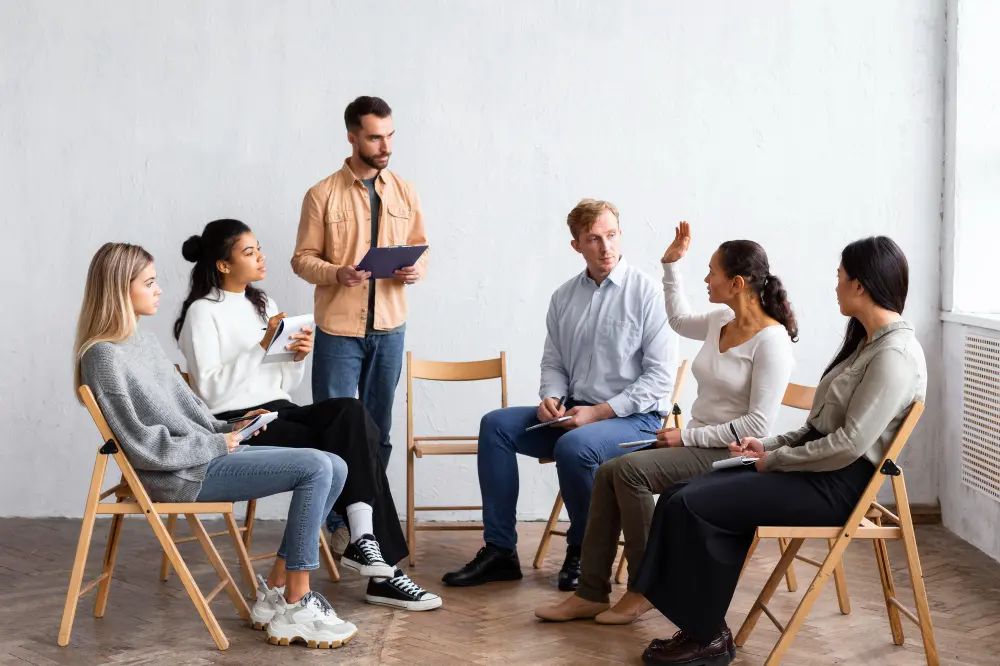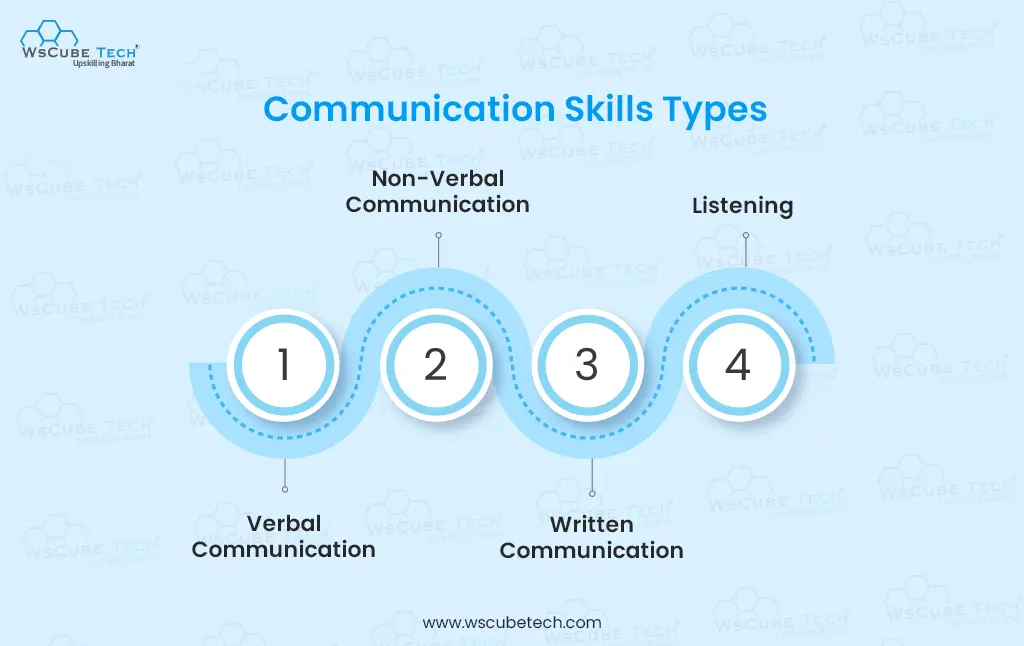“The way we communicate with others and with ourselves ultimately determines the quality of our lives.” – Tony Robbins
This insightful observation by Tony Robbins highlights the importance of effective communication in every aspect of our lives. In professional development, the ability to convey ideas clearly, listen empathetically, and understand non-verbal signs is not just an asset, but a necessity.
Our interactions, how we present ourselves, how we interpret the messages of others, and even how we talk to ourselves in moments of self-reflection all depend on our communication skills.
When we talk about professional life, effective communication skills are not optional, but essential. It is important in various aspects, from cracking a job interview and pitching an idea, to leading a team.

At WsCube Tech, we understand the huge role communication plays in shaping successful careers. That’s why we’ve crafted this comprehensive guide on how to improve communication skills.
What are Communication Skills?
Communication skills are the abilities you use when giving and receiving different kinds of information. In simple terms, they are the skills that enable you to convey a message to another person effectively and efficiently.
Good communication skills involve listening, speaking, observing, and empathizing. They are crucial in both personal and professional interactions.
For example, imagine you’re in a team meeting at work. You have an idea to improve a project. Using your communication skills, you would:
- Listen Actively: First, you listen carefully to what others are saying about the project, understanding their points and perspectives.
- Speak Clearly and Concisely: Then, you clearly and succinctly explain your idea, making sure to articulate why you think it’s beneficial.
- Observe Non-Verbal Signals: While speaking, you also pay attention to the body language and facial expressions of your colleagues to gauge their reactions.
- Empathize: Finally, you show understanding and consideration for any concerns or questions they raise about your idea.
This example shows how communication skills involve not just talking, but also listening and understanding others, all of which are essential for effective interactions.
Upskill Yourself With Live Training (Book Free Class)
Importance of Communication Skills in Professional Life

Communication skills are important in professional life for several reasons:
- Better Collaboration and Teamwork: Effective communication is key to successful collaboration. In a workplace where teams depend on each other to achieve goals, the ability to clearly convey ideas, listen to others, and resolve conflicts through discussion is crucial.
- Problem-Solving and Decision-Making: Good communication helps professionals to discuss problems openly, brainstorm solutions, and make informed decisions. This process is essential for the smooth operation and progression of any organization.
- Boosts Leadership Abilities: Leaders with strong communication skills can inspire and motivate their teams, clearly express goals and expectations, and provide constructive feedback. This helps in building trust and respect, which are fundamental for effective leadership.
- Improves Client Relationships: In roles that involve client interaction, communication skills are critical. Being able to understand client needs, address their concerns, and present solutions effectively leads to stronger, more profitable business relationships.
- Career Advancement: Professionals who communicate effectively are usually more competent. They are likely to be noticed, appreciated, and considered for promotions or leadership roles, as good communication is a sign of managerial and executive potential.
- Networking: Strong communication skills are essential for networking. They enable professionals to build connections, gain industry insights, and create opportunities for collaboration and growth.
- Reduces Misunderstandings: Clear communication minimizes the chances of misunderstandings and errors, which can save time and resources for the company. It ensures that everyone is on the same page and working towards common goals.
- Enhances Professional Image: Being expressive, clear, and effective in communication enhances your professional image. It portrays confidence, professionalism, and competence.
- Improves Customer Service: In customer-facing roles, effective communication is key to understanding customer issues and resolving them satisfactorily. This not only resolves immediate concerns but also helps in building customer loyalty.
Also read: Best Career Objective for Resume for Freshers in 2025 (With Samples)
Components of Effective Communication Skills
Effective communication skills are not just about how well you can speak or talk to others, but it also includes several more things. Let’s understand these components:
- Listening: Arguably the most crucial aspect of effective communication. Good listening means paying full attention to the speaker, understanding their message, and responding appropriately. It’s not just about hearing the words but also about picking up on emotions and what’s not being said.
- Clarity and Conciseness: Being clear and concise helps to prevent misunderstandings. This means straightforwardly expressing your thoughts and ideas and avoiding unnecessary jargon or complex language that might confuse the listener.
- Confidence: Showing confidence in your communication includes speaking assertively, maintaining eye contact, and using a steady, audible tone. Confidence helps in making your message more convincing and reliable.
- Empathy: Understanding and respecting the emotions and viewpoints of others is essential. Empathy involves putting yourself in someone else’s shoes and addressing their feelings and concerns, which can greatly improve the effectiveness of your communication.
- Body Language: Non-verbal cues like gestures, facial expressions, posture, and eye contact can say as much as words. Effective communicators are aware of their body language and use it to reinforce their message.
- Feedback: Being open to giving and receiving feedback is a critical component. Feedback helps to clarify that your message has been received as intended and allows for adjustments in communication styles if necessary.
- Respect: Showing respect in communication involves acknowledging the other person’s perspective, avoiding interrupting when they are speaking, and addressing them in a courteous and considerate manner.
- Open-Mindedness: Being open to other perspectives and ideas, and not being judgmental or biased in your communication, fosters a more inclusive and constructive dialogue.
- Tone of Voice: The tone of your voice can greatly affect how your message is received. It conveys your mood and emotions, and it should match the content of your message.
- Asking Questions: Effective communicators ask questions to gain a deeper understanding, encourage a two-way dialogue, and engage the other person in the conversation.
- Adjusting to the Audience: Tailoring your communication style to your audience – considering factors like their age, culture, education level, and familiarity with the topic – is important for ensuring your message is understood.
- Active Engagement: Showing interest and engagement in the conversation, such as nodding or making appropriate verbal acknowledgments, encourages a more dynamic and reciprocal communication.
Also read: How to Write a Job Application Email in 2025? (With Samples)
Types of Communication Skills

The different types of communication skills include verbal communication, non-verbal communication, listening, written communication, interpersonal communication, and visual communication.
1. Verbal Communication
This includes using spoken words to convey a message.
Examples:
- face-to-face conversations
- telephone calls
- voice chats
- any other circumstances where speaking is involved
Key skills in verbal communication:
- clarity of speech
- remaining concise
- being fluent
- using an appropriate tone and vocabulary
2. Non-Verbal Communication
This includes the messages conveyed through:
- body language
- facial expressions
- gestures
- eye contact
- posture
- even the physical distance between the communicators
Non-verbal signals can sometimes communicate more than words and can be used to understand or contradict what’s being said. Being aware of and controlling your own body language, as well as correctly interpreting others’, is crucial.
3. Written Communication
This type of communication skill includes any message conveyed through written symbols (letters, words, and punctuation).
Examples:
- emails
- reports
- letters
- social media posts
- text messages
Key aspects:
- good grammar
- clear structure
- concise and clear language
- appropriate tone depending on the audience and context
4. Listening
Generally considered a part of verbal communication, listening is important enough to be classified on its own.
This skill includes:
- actively paying attention to what others are saying
- understanding the message
- responding appropriately
Active listening, empathy, and feedback are key components.
How to Improve Communication Skills? (Verbal)

Improving verbal communication is key to expressing yourself clearly and making a positive impression in both personal and professional settings.
1. Techniques for Clear Communication
- Practice Slow and Deliberate Speaking: Fast speech can blur your words. Practice speaking slowly and deliberately to ensure each word is clearly pronounced.
- Practice Tongue Twisters: Practicing with tongue twisters can improve communication skills by training your mouth and tongue to pronounce difficult sounds more clearly. An example of a tongue twister: “Peter Piper picked a peck of pickled peppers.”
- Record and Listen to Your Speech: Recording yourself speaking and then listening back can help you identify areas for improvement in your voice and pronunciation.
- Read Aloud Regularly: This exercise helps you get used to speaking words clearly and can also expand your vocabulary.
- Take Feedback: Ask friends, family, or colleagues for honest feedback about your speech clarity. It is one of the best tips on how can you improve communication skills.
2. Understand Impact of Tone on Conveying Messages
- Be Aware of Your Tone: Your tone conveys emotions and attitudes. A friendly, positive tone can make your message more receptive, while a harsh tone can create resistance.
- Match Tone with Message: Ensure your tone matches the content of your message. A serious message should have a serious tone, while a light-hearted message can be delivered with a more playful tone.
- Practice Modulating Your Voice: Vary your pitch to emphasize key points and avoid a monotonous speech pattern.
- Use Your Voice to Engage: Changes in tone can keep the listener engaged. Practice using a dynamic range to make your speech more interesting.
3. Strategies for Effective Public Speaking and Presentations
- Know Your Audience: Personalize your speech to the interests, level of understanding, and attitudes of your audience.
- Organize Your Content: Start with a clear introduction, followed by the body of your presentation, and conclude with a strong closing statement that reinforces your key points.
- Practice, Practice, Practice: Familiarity with your content can boost your confidence and reduce anxiety.
- Engage with Your Audience: Ask questions, invite participation, and be responsive to audience reactions and questions.
- Manage Anxiety: Techniques such as deep breathing, positive visualization, or even mild physical exercises before speaking can help manage nervousness.
By working on these aspects of verbal communication, you can significantly improve your ability to communicate your thoughts and ideas effectively.

How to Develop Communication Skills? (Non-Verbal)
Enhancing non-verbal communication is important because it conveys more than words alone.
Understand Body Language
- Study Common Gestures and Postures: Familiarize yourself with common body language cues. For example, crossed arms indicate defensiveness or a lack of engagement. Whereas, an open body posture suggests openness and interest.
- Observe Others: Pay attention to how others use body language in various situations. This can provide insights into how different gestures and postures are perceived.
- Reflect on Your Own Body Language: Be aware of your habitual non-verbal signals. Are you often closed-off or open in your gestures? Adjust accordingly to convey the right message.
- Context Matters: Interpret body language in the context of the situation, cultural norms, and individual differences. What might be a sign of discomfort in one context could be completely benign in another.
Tips to Maintain Positive & Professional Body Language
- Adopt an Open Posture: Stand or sit straight, avoid crossing arms or legs, and face your audience or conversation partner. This conveys engagement and openness. It is among the top tips on how to improve your communication skills.
- Use Gestures: Controlled gestures help you emphasize points and make your communication more dynamic, but avoid overdoing it.
- Mirror the Other Person: Subtly mirroring the body language of the person you are speaking with can build rapport and make them feel more at ease.
- Maintain Appropriate Physical Distance: Be mindful of personal space. Different cultures have varying norms about the acceptable physical distance during a conversation.
- Practice a Firm Handshake: A firm handshake conveys confidence and professionalism.
Role of Eye Contact and Facial Expressions
- Maintain Appropriate Eye Contact: Eye contact is crucial for connection and trust. However, too much can be intimidating, and too little can seem disinterested. Find a balance that feels natural and respectful.
- Be Expressive But Genuine with Facial Expressions: Your facial expressions should reflect your emotions and responses to the conversation. Smiling can be particularly powerful in creating a friendly and open environment.
- Be Attentive to the Other Person’s Facial Expressions: This can give you signs on how they are receiving your message and whether they are engaged or not.
Also read: Top 20 HR Interview Questions And Answers in 2025 (With Sample)
How to Enhance Communication Skills? (Listening)
Mastering listening skills is essential for effective communication. Active listening not only involves hearing the words being said but also understanding the complete message being conveyed.
The following tips will help you improve your listening skills:
1. Give Your Full Attention
Focus on the speaker without distractions. Put away your phone, turn off your computer screen, and eliminate other distractions.
2. Show That You’re Listening
Use non-verbal cues like nodding, maintaining eye contact, and leaning forward slightly to demonstrate engagement.
3. Reflect Back What You Hear
Paraphrasing or summarizing what the speaker has said not only shows that you are listening but also helps you understand the message more clearly.
4. Ask Open-Ended Questions
Encourage the speaker to elaborate or clarify their points. This shows genuine interest and helps you gain a deeper understanding of the message.
5. Avoid Interrupting
Let the speaker finish their thoughts without interruption. Interrupting can be perceived as disrespectful and may disrupt the flow of communication.
6. Respond Appropriately
Offer relevant and thoughtful responses or feedback. This demonstrates that you’ve processed the information and are engaged in the conversation.
7. Use Verbal Affirmations
Simple responses like “I see,” “I understand,” or “That makes sense” can encourage the speaker and show that you are following along.
8. Maintain Appropriate Facial Expressions
Your facial expressions should match the nature of the conversation. Show concern, interest, or understanding through your expressions.
9. Don’t Jump to Conclusions
Avoid forming a response or opinion before the speaker has finished. Jumping to conclusions can lead to misunderstandings.
10. Don’t Make Assumptions
Assumptions can skew your understanding of the message. Clarify and confirm before reacting.
Also read: Top 15 Highest Paying Jobs in India for 2025 (Revealed)
How to Improve Communication Skills? (Written)
Now, let’s know how to improve your written communication skills like a pro:
1. Be Clear and Concise
Use simple, straightforward language. Avoid jargon and complex sentences that might confuse the reader.
2. Know Your Receipient
Tailor your writing style to your audience. What works for a technical report may not be suitable for a client email.
3. Use an Appropriate Tone
The tone should match the purpose of your communication. Be professional, but also consider if a more friendly or formal tone is appropriate.
4. Stay on Topic
Stick to the main point or purpose of your communication. Avoid unnecessary details that can dilute the primary message.
5. Use More Active Voice
Active voice makes your writing more direct and dynamic. For example, “The team achieved the targets” (active) is preferable to “The targets were achieved by the team” (passive).
6. Structure Emails and Reports for Clarity
- Start with a Clear Subject Line or Title: This gives the reader an immediate understanding of the content.
- Begin with the Most Important Information: Especially in emails, start with the main point or request before providing additional details.
- Use Headings and Bullet Points: This helps to organize information and makes your document easier to scan.
- Keep Paragraphs Short: Long paragraphs can be daunting and hard to follow. Break text into manageable, focused paragraphs.
- Include a Call to Action if Needed: Clearly state what you expect the reader to do next, whether it’s to reply, complete a task, or consider a proposal.
7. Proofread and Edit
- Take a Break Before Proofreading: If time allows, step away from your writing before proofreading. You’ll return with fresh eyes.
- Read Aloud: This can help catch errors and awkward phrasing that you might miss when reading silently.
- Use Spellcheck Tools, But Don’t Rely on Them Completely: Tools like Grammarly and spellcheck are helpful, but they can miss context-specific errors.
- Check for Common Errors: Pay extra attention to common mistakes like their/there/they’re, your/you’re, and its/it’s.
Also read: How to Introduce Yourself in a Job Interview? Tips & Samples
Effective Communication Tips for Job Interview
Communication skills are a key aspect of performing well in job interviews. They can significantly impact how you are perceived by interviewers and can often make the difference between securing the job or not.
These are some of the most effective tips on how to improve communication skills for a job interview:
- Prepare for Common Questions: Familiarize yourself with common HR interview questions like “Tell me about yourself,” “What are your strengths and weaknesses?” or “Why do you want to work here?”
- Practice Your Responses: Prepare and practice answers, but avoid memorizing them verbatim to ensure your responses sound natural and spontaneous.
- Use the STAR Method for Behavioral Questions: For questions about your experiences, structure your answers using the Situation, Task, Action, Result (STAR) format to provide clear and concise responses.
- Understand the Job and Company: Customize your responses to reflect how your skills and experiences align with the job requirements and the company’s values.
- Manage Body Language: Use positive body language. Sit up straight, maintain good eye contact, and use measured hand gestures to emphasize points.
- Verbal Communication: Speak clearly and at a moderate pace. Avoid fillers like “um” and “like.”
- Prepare and Rehearse: Knowing your material well can boost confidence. Practice answering questions aloud, ideally in a mock interview scenario.
- Mindset: Go into the interview with a positive attitude. Remember, the interview is as much an opportunity for you to evaluate the company as it is for them to evaluate you.
- Be Honest: If you don’t know the answer, it’s better to admit it honestly rather than attempting to bluff your way through.
- Redirect to Your Strengths: If a question touches on a weaker area, answer honestly but pivot to discussing how you’re working to improve or how your other strengths compensate.
- Ask for Clarification: If a question is unclear, it’s perfectly acceptable to ask for more information or for the question to be rephrased.
- Use Difficult Questions as an Opportunity: Tough questions can be a chance to turn a negative into a positive. For instance, discussing a failure can be an opportunity to highlight your resilience and learning ability.

FAQs About Enhancing Communication Skills
The time it takes to improve communication skills can vary depending on individual effort and the specific areas of improvement. Consistent practice and real-world application are key. Some people see improvements in a few weeks, while others might take longer to notice significant changes.
Absolutely. With the increasing prevalence of remote work and virtual meetings, communication skills are just as crucial in virtual settings. Clear articulation, effective listening, and understanding non-verbal cues through video are all important in a digital context.
Self-assessment can be done by reflecting on past communication experiences, seeking feedback from friends, family, or colleagues, and observing your comfort level and effectiveness in various communication scenarios. Professional assessments are also available through certain courses or career counselors.
Cultural differences can significantly impact communication styles and interpretations. Understanding and respecting these differences is crucial, especially in multicultural environments or global business settings. Adaptability and sensitivity to cultural nuances are important skills.
Body language is extremely important and can sometimes convey more than spoken words. Non-verbal cues such as facial expressions, gestures, and posture play a crucial role in how your message is received and interpreted.
Yes, improving communication skills can significantly benefit personal relationships. Skills like active listening, empathy, and clear expression are key to understanding and connecting with others on a deeper level.
Open and honest dialogue is crucial in addressing communication barriers. Encouraging feedback, fostering an environment of respect and understanding, and adapting communication styles to meet the needs of the team can be effective strategies.
Yes, adapting your communication style based on the context, audience, and purpose of the interaction is important for effective communication. The style you use in a team meeting may differ from that in a formal presentation or a casual conversation with a colleague.
Maintaining good communication skills requires ongoing practice, continuous learning, and self-awareness. Regularly engaging in diverse communication scenarios, seeking feedback, and staying updated on communication best practices are essential.
Free Courses for You
| Course Name | Course Name |
| Google Tag Manager Course | Affiliate Marketing Course |
| Semrush Course | Video Editing Course |
| Blogging Course | Email Marketing Course |
| Shopify Course | Photoshop Course |
Conclusion:
Mastering communication skills is a journey that not only enhances your professional interactions but also enriches your personal life. By actively working on verbal and non-verbal communication, listening attentively, and expressing yourself clearly and effectively, you open doors to new opportunities and build stronger relationships.
Read more blogs



